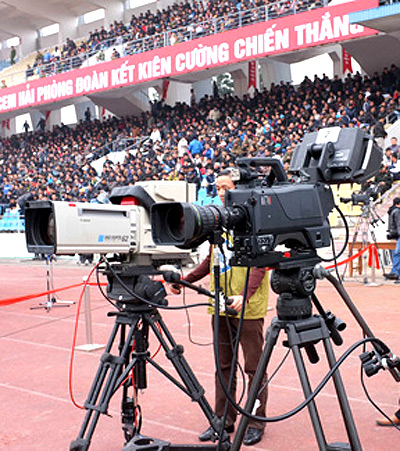
The inspection delegation has got several meetings with the VFF and the VPF to understand their procedures of contract signing and the legal base of the contract.
There were two questions raised by the Vietnam Professional Football (VPF) Company about the legality of the contract. When signing the contract, the AVG was a pirate broadcasting company. It has not yet had the rights to produce broadcasting programmes. Furthermore, the VFF signed the contract without credential from any professional football club.
Currently, the delegation has been reviewing and waiting the official comments from the Ministry of Justice about the license granted to the AVG by the Investment and Planning Department of Khanh Hoa province.
The broadcasting right conflicts have started before the opening ceremony of the Super League 2012 as soon as central broadcasting channels namely: VTV, VTC, and HTV opposed the AVG’s new way of exploit of broadcasting rights. According to this approach, the AVG coordinated with local broadcasting channels to produce live programmes and sell advertising positions. The AVG has also taken the priority in interesting matches. Meanwhile, the list of live matches for other broadcasting channels is limited. Apart from that, according to the channels, the cost to buy the license to broadcast the matches live is much higher this year.
Then, the VPF jumped in to re-negotiate the contracts with the AVG and allowed other channels to produce live football matches during the negotiation time. The VPF disagreed with the 20 year term of the contracts and the cost of 6 billion VND per annum with an extra annual increase of 10%. The VPC requested the AVG to shorten the contract term to three year and consider the cost of 10 billion VND per annum.
The AVG didn’t agree with the VPF, didn’t realize the legality of the VPF’s contracts, and opposed the live broadcasting rights of other channels. The VFF was on the side of the AVG as it signed the rights contract with the AVG.
The dispute went on until the VPF announced the illegality of the contract and sent an official document to the Ministry of Justice, the MCST, and the Ministry of Information and Communications on January 4th to request the verification of the legality of the contract between VFF and AVG. AVG also submitted an official document to the MCST to request the same.
On January 9th, the MCST decided to inspect the 20 year right contract between VFF and AVG with the deadline of 15 working days.
AT